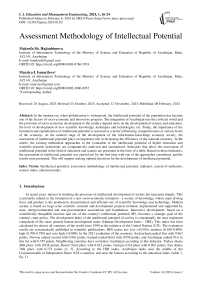Assessment Methodology of Intellectual Potential
Автор: Makrufa Sh. Hajirahimova, Marziya I. Ismayilova
Журнал: International Journal of Education and Management Engineering @ijeme
Статья в выпуске: 1 vol.14, 2024 года.
Бесплатный доступ
In the modern era, when globalization is widespread, the intellectual potential of the population has become one of the factors of socio-economic and innovative progress. The integration of Azerbaijan into the civilized world and the provision of socio-economic development in the country depend more on the development of science and education, the level of development of new scientific knowledge, techniques and technologies, etc. Today, the importance of the formation and capitalization of intellectual potential is assessed as a factor influencing competitiveness at various levels of the economy. At the modern stage of the development of the information-knowledge economy society, the assessment of intellectual potential plays an important role in increasing the efficiency of the national economy. In the article, the existing methodical approaches to the evaluation of the intellectual potential of higher education and scientific-research institutions are comparatively analyzed and summarized. Indicators that allow the assessment of intellectual potential in the field of education and science are presented in the form of a table. Based on these indicators, the assessment of intellectual potential was carried out for the first time with one of the approaches considered, and the results were presented. This will support making optimal decisions for the development of intellectual potential.
Intellectual potential, assessment methodology of intellectual potential, indicator, system of indicators, science index, education index
Короткий адрес: https://sciup.org/15018830
IDR: 15018830 | DOI: 10.5815/ijeme.2024.01.02
Список литературы Assessment Methodology of Intellectual Potential
- M. Sh Hajirahimova, M. I. Ismayilova, “Analysıs of ıntellectual potentıal measurement ındıcators,” Problems of Information Society, vol. 14, no. 1. pp. 53-65, 2023, doi:10.25045/jpis.v14.i1.06.
- V. K. Levashov, “The Intellectual Potential of Society: Sociological Measurement and Forecasting,” Psychological Science and Education,” vol. 14, no. 4, pp. 41-49, 2009.
- M. Sh .Hajirahimova, “Theoretical and methodological aspects of intellectual potential assessment. The ınformatıon systems and technologıes: achıevements and perspectıves,” III INTERNATIONAL SCIENTIFIC CONFERENCE, Sumgait. SDU, 2022, pp. 307-309.
- Human Development İndex (HDİ). 2021. Available at: https://www.unesco.org/en/world-media-trends/human-development-index-hdi
- Human development report 2021-2022. Available at: https://hdr.undp.org/data-center/human-development-index#/indicies/HDI
- Human Development Report 2021-2022 - Uncertain Times, Unsettled Lives - Shaping our Future in a Transforming World. Available at: https:// HumanDevelopment Report 2021-2022 Uncertain Times, Unsettled Lives Shaping Future Transforming World.pdf
- Indicators. 2023. Available at: https://data.worldbank.org/indicator
- P.Drucer, “The New Society of Organizations,” Harvard Business Review, 1992.
- L. Edvinsson, M. Malone, “New York: Intellectual Capital”, Harper Business, 1997, p.225.
- J, David Skyrme, “Measuring Knowledge: A Plethora of Methods,” David Skyrme Associates, 2007. Available at: http://www.skyrme.com/insights/24kmeas.htm 6. 3
- G. V. Leonidova, “Intellectual potential of population: theoretical and methodological framework for research,” The journal Economic and social changes: facts, trends, forecast, vol. 1, no. 31, pp. 43-58, 2014, doi:10.15838/esc/2014.1.31.6.
- B. Bec, “Moč intelektualnega kapitala,” 2014. Available at:http://www.poslovnisvet.si/vodenje/moc-intelektualnega-kapitala
- A. B. Doktorovich, “Sociological analysis and methodology for assessing the development of intellectual potential,” News of Moscow Univ, no. 1, pp. 143-154, 2012.
- M. Tanaka, “Japanese-style evaluation systems for R&D projects: The MITI experience,” Research Policy, vol. 18, no. 6, pp. 361–378, 1989.
- F. Kodama, F. Niwa, “Structure Analysis of the Japanese Science and Technology Indicator System and its Evaluation,” Journal of Science Policy & Research Management, vol. 2, no. 2, pp. 173-183, 1987.
- D. M. Kangalakova, D.A. Rakhmetova, “Assessment of the intellectual potential of regions: methodological foundations of the study,” The Journal of Economic Research & Business Administration, vol. 135, no. 1, 2021, doi:10.26577/be.2021.v135.i1.07.
- K.A. Zadumkin, I.A. Kondakov, “Methodology for comparative assessment of the scientific and technical potential of the region,” Innovative development, vol. 4, no. 12, pp. 86- 100, 2010.
- G.Garafiyeva, “Intellectual potential of higher education institution: measurement technique”, BUKEP Bulletin, no. 1, pp. 353-358, 2014.
- A. D. Hüseynova, “SCIENCE AND INNOVATION ACTIVITY: measurement and evaluation”, Baku: TUNA, 2020, 374 p.
- Education, science and culture in Azerbaijan. Available at: https://www.stat.gov.az
- Education Index. Available at: https://en.wikipedia.org/wiki/Education_Index#cite_note-4
- M. Sh. Hajirahimova, A. S. Aliyeva, “Migration problems of intellectual human resources: Impact of brain drain on national security.” Proc. of the International Scientific Conference of Educational and scientific activity in a new time: Realities and challenges, Mingachevir, vol. 2, 16-17 dec., 2022, pp. 70-73.


